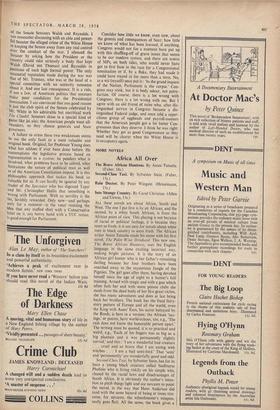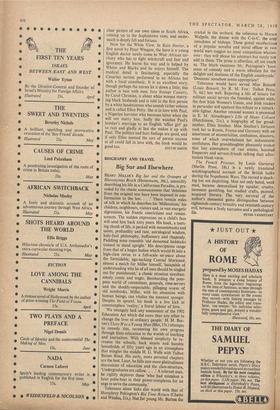MORE NOVELS
Africa All Over
Into Strange Country. By Carol Christian. (Allen and Unwin, 15s.) ALL these novels are about Africa, South and West. The one 1 put first is by an African, and the
second, by a white South African, is from the African point of view. This placing is not because of racial or political feelings, it is because they seem so fresh; it is not easy for novels about white men in black country to seem fresh. The African writer Amos Tutuola made his name with his first
novel, The Pal►►► Wine Drinkard. This new one, The Brave African Huntress, uses the English language in the same exciting incorrect way,
making bright pictures. It is the story of an African girl hunter who is her father's remaining darling because her four brothers have been snatched away to the mysterious Jungle of the Pigmies. The girl goes after them, having devoted herself since the age of eight to a hunter's full training. Armed with magic and with a gun which often fails her and with some poison clubs she steals from the dead body of her first great victim, she has many adventures and does at last bring back her brothers. The book has the fixed fairy- story pattern of Europe and all the world, even the King with Asses' Ears, his secret betrayed by the Reeds, is here in a versioh; the African 'say- ings,' or poems, have world-echoes, too, e.g., 'The rain does not know the honorable person apart.'
The writing must be quoted, it is so practical and weird, e.g., 'Each of his fingers was as big as a big plantain and it was permanently slightly curved,' and this : '1 am a wonderful bad creature . . . cruel and so brave that I am eating with witches . . . I am a b'ad semi-bird.' That 'semi'
and 'permanently' are wonderfully good and odd. Second-Class Taxi, by Sylvester Stein, has for its hero a young black creature called Staffnurse
Phofolo who is living riskily on his simple wits, chased by the racial laws and disadvantages of South Africa. It is obviously the author's inten- tion to pitch things light and use sarcasm to point
the moral, in the way that Hans Andersen did (and with the same hazard of being at times tire-
some, for sarcasm, the schoolmaster's weapon, easily goes flat). All the same, the book gives a clear picture of our own times in South Africa, coming up to the Sophiatown riots, and under- neath is deeply felt and furious.
Now for the White View. In Rain Doctor, a first novel by Peter Wingate, the hero is a young English doctor newly come to West African ter- ritory who has to fight witchcraft and fear and ignorance. He learns his way and is helped by Whites and Blacks and he enjoys himself. The medical detail is fascinating, especially the Caesarian section performed in an African but with a local anesthetic. It is an excellent story, though perhaps the nurses let it down a little; this author is best with men. Into Strange Country, by Carol Christian, is about white women marry- ing black husbands and is told in the first person by a white headmistress who sounds rather solemn and is called Ellen Petty. She is in love with Paul, a Nigerian barrister who becomes bitter when she will not marry him. Sadly she watches Paul's brother's marriage to an English 'office girl' go to ruin and gladly at last she makes it up with Paul. The politics and hurt feelings are good, and if only Ellen seemed the sort of person anyone at all could fall in love with, the book would be











































 Previous page
Previous page